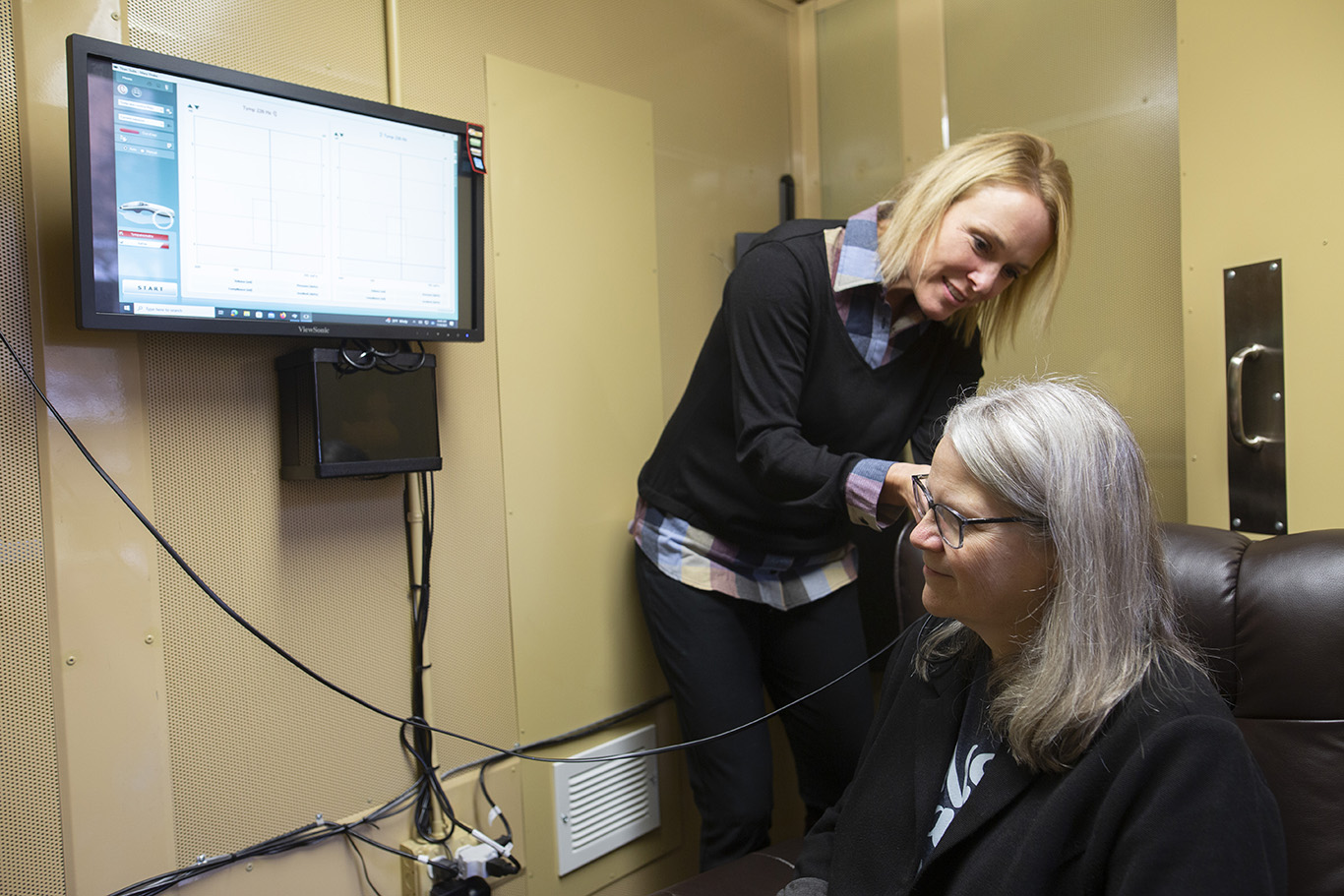The Lighthouse
Dale Wolf ’85 (history) and Beth (Grabinger) Wolf ’84 (speech language hearing sciences) and ’85 (speech language pathology & audiology) are partners – in life and in work. They met at Bismarck State College and together transferred to MSUM. Together, they are faith leaders – Dale has worked in churches since he was 18; Beth taught Sunday school and was involved in worship groups since high school. After Dale completed Luther Seminary, he served churches in Minnesota and North Dakota before accepting a call to Atonement Lutheran Church in Fargo, a youthful, growing church eager for entrepreneurial leadership. Together, through faith, and their affable personalities, his inspiring messages and her musical talents, the ministry grew. Membership tripled, a new sanctuary was built, a popular daycare, preschool and after school program was established, the children’s and youth ministry thrived, a new denomination (Lutheran Congregations in Mission for Christ) was created.
However, the 20-year roller coaster ride of being a spiritual leader at the local, regional and national level began to take its toll. Dale’s world, and Beth’s, began to unravel. Well equipped to care for others and guide them through their own struggles, Dale failed to take care of himself and deal with his own frailties. What ensued was a spiraling downward slide that changed the course of his life. Fatigue. Burnout. Depression. Alcoholism. Relapse. Resignation. Loss – of job, of friends, of faith.
The Fall
Dale knew in high school ministry was his calling. Yet, at age 51, he drank himself out of a job.
Burnout had been building for years – work crises, hectic life and not taking care of himself.
“My implosion was rooted in a sense of deep depression,” Dale said. “I struggled with an addiction I didn’t understand, and didn’t know what to do about it. I fell from a pretty prominent position locally and nationally. It was my rock bottom.”
He was without a church and without a plan. “I was pretty certain I was done with the ministry, and I didn’t feel like being part of any church. I also feared I might lose my faith.”
Slowly, healing began. He learned tools for self-care and studied the spiritual principles as revealed in the 12-step recovery. He devoted time for his spiritual relationship and journaled religiously. He attended recovery meetings and worked through his issues. Surprisingly, it was in recovery where he felt encouraged, and almost energized, to continue in ministry.
He says one of the most profound experiences of his life was sitting in a recovery meeting with an amazingly diverse community ranging from business leaders to homeless people, representing many nationalities and all ages – gathered for one purpose: to celebrate successes and encourage those who’ve stumbled. Unconditional acceptance.
“This is what the church is supposed to look like. For many people in recovery, the church was the last place they experienced welcoming acceptance,” Dale said. “It became clear to me that some people in the recovery world acted more like Jesus than people in the church.”
That revelation, along with friends encouraging him to continue ministry, rekindled his creative juices and entrepreneurial energies, feelings long lying dormant. Despite working his way through recovery, he imagined a different kind of church and was excited to start something new.
“God brought me through this experience so I could create a different kind of church community where people are free to share their struggles and challenges and express their doubts and questions about God,” Dale said. “I wanted to create a church home where everybody feels welcome and there is no judgment, celebrating people’s victories and lifting them up when they fall.”
The Risk
A small group started meeting at Scheels Arena. In a bar. Some people might have called him crazy. Did it make sense for a recovering alcoholic to start a new church?
“My biggest concern was if the burnout returned,” said Beth, his wife of 34 years. “But he worked really hard on making himself healthy. He is such a gifted pastor and a great teacher. I didn’t think he should be done (with ministry).”
They say nine out of 10 start-ups fail (Fortune). The North American Mission Board estimates 33 percent of new churches won’t survive past the fourth year. Other estimates range from 4,000 to 10,000 churches closing this year. And while 40 percent of Americans “say” they attend church, less than 20 percent actually do (Pew Research Center). Not the best stats for beginning a new ministry. It wasn’t a well-researched business plan, but Dale’s entrepreneurial spirit believed God was calling him and Beth to do this important work.
And people showed up. Congregants from his previous church. People from recovery. Curiosity seekers. After several months, they outgrew the bar. As if it were divine intervention, a benefactor who supported Dale’s vision donated a vacant church building in downtown Fargo.
He says staying in Fargo was important because it’s where he found healing. He says starting a church is easy – he delivers the message, Beth leads the music. But operating a church is hard. “It’s much scarier to me to see what God is doing now,” Dale said.
The Lighthouse
In naming the new enterprise, Dale and Beth chose ‘lighthouse’ because it points people to safety, hope and purpose. It does not bring still waters, but guides people through rough waters.
“We are a come-as-you-are, recovery-based church where we don’t judge. We love, accept and welcome,” Dale said. “What’s unique is the intentionality of trying to be what we say we are.”
Jeremy Ruppert was agnostic most of his life. Dying of alcoholism, he came to believe in God as a last resort.
“I didn’t care for religion, I didn’t care for Christianity, and I didn’t believe in Jesus,” he said.
He and Dale met in recovery and quickly became friends. He asked Dale if it was OK for a non-Christian to go to Lighthouse Church, since he was not certain he’d be welcome.
“Dale almost always starts his message with saying ‘no perfect people allowed.’ I’ve been in recovery awhile and talk about my problems and my beliefs, which is very encouraged at Lighthouse Church. That transparency was very different than what I expected,” Jeremy said. “It was amazing to me that I could explore my faith and not feel like I’m being judged if I don’t believe exactly what others believe.”
Dale describes Lighthouse Church as a place that specializes in life’s hurts, but wasn’t prepared for the level of human hurt God has brought to Lighthouse. He’s transparent about his own struggles, which is startling to some. He encourages other Christians to do the same.
“We tend to give the impression that in order to be a true follower of Jesus you have to have it all together,” Dale said. “I can speak with great confidence that there are very few of us who have it all together!”
Dale and Beth are four years into Lighthouse, and have created a new version of church that’s meeting the needs of the lost and hurting. While it’s estimated 3,500 individuals migrate away from the church every day (Barna Group), attendance at Lighthouse Church has doubled in the past nine months. On a recent Sunday, more than 200 attended. It is by all accounts, a success story. Dale is quick to say the church’s measure of success is not about the numbers, but about the number one – one person at a time.
Lighthouse Church may be a bit unorthodox for this region. People are hugged at the door. Tears may be shed. Experiences are publicly revealed about personal struggles. Ex-offenders in transition sit alongside white-haired grandmas and grandpas. Traditional ministries for children, youth, women and men exist among support groups for NA, AA, Depression, LGBT, Spirituality Recovery and more. Dale is often present.
“People are coming. We are helping their recovery, their sobriety, their mental illness, their relationship issues, their loneliness,” Dale said. “If these things have begun to be replaced by a sense of community and they meet Jesus in the midst of all of that, that’s success. It happens individually.”
“I’m a totally different person today than I was five years ago,” Jeremy said, who was baptized by Dale last year. “Having a place like Lighthouse Church to explore my faith in a safe and welcoming environment really changed my belief system and transformed me that way.”
Dale and Beth are serving people who need a place to explore their faith and share their struggles in an accepting environment. Lighthouse Church is that place.
“God wasn’t done working with Dale, and I think through Dale He’s shining the light in a lot of people’s darkness,” Beth said. “If lives are being transformed, it’s because God’s here.”
The graphic pencil drawing of Split Rock Lighthouse on the North Shore of Lake Superior was done by Jeremy Ruppert, a friend of Dale’s. With no formal training, he learned through practice and experimentation. He says, “I was trying to figure out what I’m good at and what to do the rest of my life, but the lesson I learned was to figure out what I want to do with my life and then get good at it.”
View Jeremy's work at jeremyruppert.com.
Learn more about Lighthouse Church at lighthousechurchfargo.org
This story was first published in Moorhead Magazine, Fall 2017.
Make Sure Your Story Is Heard
Let us know how your life has been changed by being a Dragon: tell us your MSU Moorhead story today!
Send Us Your Story


